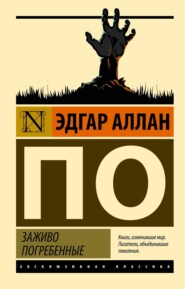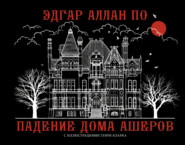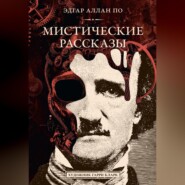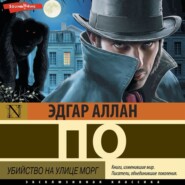По всем вопросам обращайтесь на: info@litportal.ru
(©) 2003-2025.
✖
The Works of Edgar Allan Poe – Volume 1
Настройки чтения
Размер шрифта
Высота строк
Поля
“True; and you will remember an expression attributed almost unanimously, by the evidence, to this voice, – the expression, ‘mon Dieu!’ This, under the circumstances, has been justly characterized by one of the witnesses (Montani, the confectioner,) as an expression of remonstrance or expostulation. Upon these two words, therefore, I have mainly built my hopes of a full solution of the riddle. A Frenchman was cognizant of the murder. It is possible – indeed it is far more than probable – that he was innocent of all participation in the bloody transactions which took place. The Ourang-Outang may have escaped from him. He may have traced it to the chamber; but, under the agitating circumstances which ensued, he could never have re-captured it. It is still at large. I will not pursue these guesses – for I have no right to call them more – since the shades of reflection upon which they are based are scarcely of sufficient depth to be appreciable by my own intellect, and since I could not pretend to make them intelligible to the understanding of another. We will call them guesses then, and speak of them as such. If the Frenchman in question is indeed, as I suppose, innocent of this atrocity, this advertisement which I left last night, upon our return home, at the office of ‘Le Monde,’ (a paper devoted to the shipping interest, and much sought by sailors,) will bring him to our residence.”
He handed me a paper, and I read thus:
CAUGHT —In the Bois de Boulogne, early in the morning of the – inst., (the morning of the murder,) a very large, tawny Ourang-Outang of the Bornese species. The owner, (who is ascertained to be a sailor, belonging to a Maltese vessel,) may have the animal again, upon identifying it satisfactorily, and paying a few charges arising from its capture and keeping. Call at No. – , Rue – , Faubourg St. Germain – au troisième.
“How was it possible,” I asked, “that you should know the man to be a sailor, and belonging to a Maltese vessel?”
“I do not know it,” said Dupin. “I am not sure of it. Here, however, is a small piece of ribbon, which from its form, and from its greasy appearance, has evidently been used in tying the hair in one of those long queues of which sailors are so fond. Moreover, this knot is one which few besides sailors can tie, and is peculiar to the Maltese. I picked the ribbon up at the foot of the lightning-rod. It could not have belonged to either of the deceased. Now if, after all, I am wrong in my induction from this ribbon, that the Frenchman was a sailor belonging to a Maltese vessel, still I can have done no harm in saying what I did in the advertisement. If I am in error, he will merely suppose that I have been misled by some circumstance into which he will not take the trouble to inquire. But if I am right, a great point is gained. Cognizant although innocent of the murder, the Frenchman will naturally hesitate about replying to the advertisement – about demanding the Ourang-Outang. He will reason thus: – ‘I am innocent; I am poor; my Ourang-Outang is of great value – to one in my circumstances a fortune of itself – why should I lose it through idle apprehensions of danger? Here it is, within my grasp. It was found in the Bois de Boulogne – at a vast distance from the scene of that butchery. How can it ever be suspected that a brute beast should have done the deed? The police are at fault – they have failed to procure the slightest clew. Should they even trace the animal, it would be impossible to prove me cognizant of the murder, or to implicate me in guilt on account of that cognizance. Above all, I am known. The advertiser designates me as the possessor of the beast. I am not sure to what limit his knowledge may extend. Should I avoid claiming a property of so great value, which it is known that I possess, I will render the animal at least, liable to suspicion. It is not my policy to attract attention either to myself or to the beast. I will answer the advertisement, get the Ourang-Outang, and keep it close until this matter has blown over.’”
At this moment we heard a step upon the stairs.
“Be ready,” said Dupin, “with your pistols, but neither use them nor show them until at a signal from myself.”
The front door of the house had been left open, and the visitor had entered, without ringing, and advanced several steps upon the staircase. Now, however, he seemed to hesitate. Presently we heard him descending. Dupin was moving quickly to the door, when we again heard him coming up. He did not turn back a second time, but stepped up with decision, and rapped at the door of our chamber.
“Come in,” said Dupin, in a cheerful and hearty tone.
A man entered. He was a sailor, evidently, – a tall, stout, and muscular-looking person, with a certain dare-devil expression of countenance, not altogether unprepossessing. His face, greatly sunburnt, was more than half hidden by whisker and mustachio. He had with him a huge oaken cudgel, but appeared to be otherwise unarmed. He bowed awkwardly, and bade us “good evening,” in French accents, which, although somewhat Neufchatelish, were still sufficiently indicative of a Parisian origin.
“Sit down, my friend,” said Dupin. “I suppose you have called about the Ourang-Outang. Upon my word, I almost envy you the possession of him; a remarkably fine, and no doubt a very valuable animal. How old do you suppose him to be?”
The sailor drew a long breath, with the air of a man relieved of some intolerable burden, and then replied, in an assured tone:
“I have no way of telling – but he can’t be more than four or five years old. Have you got him here?”
“Oh no, we had no conveniences for keeping him here. He is at a livery stable in the Rue Dubourg, just by. You can get him in the morning. Of course you are prepared to identify the property?”
“To be sure I am, sir.”
“I shall be sorry to part with him,” said Dupin.
“I don’t mean that you should be at all this trouble for nothing, sir,” said the man. “Couldn’t expect it. Am very willing to pay a reward for the finding of the animal – that is to say, any thing in reason.”
“Well,” replied my friend, “that is all very fair, to be sure. Let me think! – what should I have? Oh! I will tell you. My reward shall be this. You shall give me all the information in your power about these murders in the Rue Morgue.”
Dupin said the last words in a very low tone, and very quietly. Just as quietly, too, he walked toward the door, locked it and put the key in his pocket. He then drew a pistol from his bosom and placed it, without the least flurry, upon the table.
The sailor’s face flushed up as if he were struggling with suffocation. He started to his feet and grasped his cudgel, but the next moment he fell back into his seat, trembling violently, and with the countenance of death itself. He spoke not a word. I pitied him from the bottom of my heart.
“My friend,” said Dupin, in a kind tone, “you are alarming yourself unnecessarily – you are indeed. We mean you no harm whatever. I pledge you the honor of a gentleman, and of a Frenchman, that we intend you no injury. I perfectly well know that you are innocent of the atrocities in the Rue Morgue. It will not do, however, to deny that you are in some measure implicated in them. From what I have already said, you must know that I have had means of information about this matter – means of which you could never have dreamed. Now the thing stands thus. You have done nothing which you could have avoided – nothing, certainly, which renders you culpable. You were not even guilty of robbery, when you might have robbed with impunity. You have nothing to conceal. You have no reason for concealment. On the other hand, you are bound by every principle of honor to confess all you know. An innocent man is now imprisoned, charged with that crime of which you can point out the perpetrator.”
The sailor had recovered his presence of mind, in a great measure, while Dupin uttered these words; but his original boldness of bearing was all gone.
“So help me God,” said he, after a brief pause, “I will tell you all I know about this affair; – but I do not expect you to believe one half I say – I would be a fool indeed if I did. Still, I am innocent, and I will make a clean breast if I die for it.”
What he stated was, in substance, this. He had lately made a voyage to the Indian Archipelago. A party, of which he formed one, landed at Borneo, and passed into the interior on an excursion of pleasure. Himself and a companion had captured the Ourang-Outang. This companion dying, the animal fell into his own exclusive possession. After great trouble, occasioned by the intractable ferocity of his captive during the home voyage, he at length succeeded in lodging it safely at his own residence in Paris, where, not to attract toward himself the unpleasant curiosity of his neighbors, he kept it carefully secluded, until such time as it should recover from a wound in the foot, received from a splinter on board ship. His ultimate design was to sell it.
Returning home from some sailors’ frolic the night, or rather in the morning of the murder, he found the beast occupying his own bed-room, into which it had broken from a closet adjoining, where it had been, as was thought, securely confined. Razor in hand, and fully lathered, it was sitting before a looking-glass, attempting the operation of shaving, in which it had no doubt previously watched its master through the key-hole of the closet. Terrified at the sight of so dangerous a weapon in the possession of an animal so ferocious, and so well able to use it, the man, for some moments, was at a loss what to do. He had been accustomed, however, to quiet the creature, even in its fiercest moods, by the use of a whip, and to this he now resorted. Upon sight of it, the Ourang-Outang sprang at once through the door of the chamber, down the stairs, and thence, through a window, unfortunately open, into the street.
The Frenchman followed in despair; the ape, razor still in hand, occasionally stopping to look back and gesticulate at its pursuer, until the latter had nearly come up with it. It then again made off. In this manner the chase continued for a long time. The streets were profoundly quiet, as it was nearly three o’clock in the morning. In passing down an alley in the rear of the Rue Morgue, the fugitive’s attention was arrested by a light gleaming from the open window of Madame L’Espanaye’s chamber, in the fourth story of her house. Rushing to the building, it perceived the lightning rod, clambered up with inconceivable agility, grasped the shutter, which was thrown fully back against the wall, and, by its means, swung itself directly upon the headboard of the bed. The whole feat did not occupy a minute. The shutter was kicked open again by the Ourang-Outang as it entered the room.
The sailor, in the meantime, was both rejoiced and perplexed. He had strong hopes of now recapturing the brute, as it could scarcely escape from the trap into which it had ventured, except by the rod, where it might be intercepted as it came down. On the other hand, there was much cause for anxiety as to what it might do in the house. This latter reflection urged the man still to follow the fugitive. A lightning rod is ascended without difficulty, especially by a sailor; but, when he had arrived as high as the window, which lay far to his left, his career was stopped; the most that he could accomplish was to reach over so as to obtain a glimpse of the interior of the room. At this glimpse he nearly fell from his hold through excess of horror. Now it was that those hideous shrieks arose upon the night, which had startled from slumber the inmates of the Rue Morgue. Madame L’Espanaye and her daughter, habited in their night clothes, had apparently been occupied in arranging some papers in the iron chest already mentioned, which had been wheeled into the middle of the room. It was open, and its contents lay beside it on the floor. The victims must have been sitting with their backs toward the window; and, from the time elapsing between the ingress of the beast and the screams, it seems probable that it was not immediately perceived. The flapping-to of the shutter would naturally have been attributed to the wind.
As the sailor looked in, the gigantic animal had seized Madame L’Espanaye by the hair, (which was loose, as she had been combing it,) and was flourishing the razor about her face, in imitation of the motions of a barber. The daughter lay prostrate and motionless; she had swooned. The screams and struggles of the old lady (during which the hair was torn from her head) had the effect of changing the probably pacific purposes of the Ourang-Outang into those of wrath. With one determined sweep of its muscular arm it nearly severed her head from her body. The sight of blood inflamed its anger into phrenzy. Gnashing its teeth, and flashing fire from its eyes, it flew upon the body of the girl, and imbedded its fearful talons in her throat, retaining its grasp until she expired. Its wandering and wild glances fell at this moment upon the head of the bed, over which the face of its master, rigid with horror, was just discernible. The fury of the beast, who no doubt bore still in mind the dreaded whip, was instantly converted into fear. Conscious of having deserved punishment, it seemed desirous of concealing its bloody deeds, and skipped about the chamber in an agony of nervous agitation; throwing down and breaking the furniture as it moved, and dragging the bed from the bedstead. In conclusion, it seized first the corpse of the daughter, and thrust it up the chimney, as it was found; then that of the old lady, which it immediately hurled through the window headlong.
As the ape approached the casement with its mutilated burden, the sailor shrank aghast to the rod, and, rather gliding than clambering down it, hurried at once home – dreading the consequences of the butchery, and gladly abandoning, in his terror, all solicitude about the fate of the Ourang-Outang. The words heard by the party upon the staircase were the Frenchman’s exclamations of horror and affright, commingled with the fiendish jabberings of the brute.
I have scarcely anything to add. The Ourang-Outang must have escaped from the chamber, by the rod, just before the break of the door. It must have closed the window as it passed through it. It was subsequently caught by the owner himself, who obtained for it a very large sum at the Jardin des Plantes. Le Don was instantly released, upon our narration of the circumstances (with some comments from Dupin) at the bureau of the Prefect of Police. This functionary, however well disposed to my friend, could not altogether conceal his chagrin at the turn which affairs had taken, and was fain to indulge in a sarcasm or two, about the propriety of every person minding his own business.
“Let him talk,” said Dupin, who had not thought it necessary to reply. “Let him discourse; it will ease his conscience, I am satisfied with having defeated him in his own castle. Nevertheless, that he failed in the solution of this mystery, is by no means that matter for wonder which he supposes it; for, in truth, our friend the Prefect is somewhat too cunning to be profound. In his wisdom is no stamen. It is all head and no body, like the pictures of the Goddess Laverna, – or, at best, all head and shoulders, like a codfish. But he is a good creature after all. I like him especially for one master stroke of cant, by which he has attained his reputation for ingenuity. I mean the way he has ‘de nier ce qui est, et d’expliquer ce qui n’est pas.’”[1 - Rousseau – Nouvelle Heloise.]
THE MYSTERY OF MARIE ROGET.(*1)
A SEQUEL TO “THE MURDERS IN THE RUE MORGUE.”
Es giebt eine Reihe idealischer Begebenheiten, die der Wirklichkeit
parallel lauft. Selten fallen sie zusammen. Menschen und zufalle
modifieiren gewohulich die idealische Begebenheit, so dass sie
unvollkommen erscheint, und ihre Folgen gleichfalls unvollkommen
sind. So bei der Reformation; statt des Protestantismus kam das
Lutherthum hervor.
There are ideal series of events which run parallel with the real
ones. They rarely coincide. Men and circumstances generally modify
the ideal train of events, so that it seems imperfect, and its
consequences are equally imperfect. Thus with the Reformation;
instead of Protestantism came Lutheranism.
– Novalis. (*2) Moral Ansichten.
THERE are few persons, even among the calmest thinkers, who have not occasionally been startled into a vague yet thrilling half-credence in the supernatural, by coincidences of so seemingly marvellous a character that, as mere coincidences, the intellect has been unable to receive them. Such sentiments – for the half-credences of which I speak have never the full force of thought – such sentiments are seldom thoroughly stifled unless by reference to the doctrine of chance, or, as it is technically termed, the Calculus of Probabilities. Now this Calculus is, in its essence, purely mathematical; and thus we have the anomaly of the most rigidly exact in science applied to the shadow and spirituality of the most intangible in speculation.
The extraordinary details which I am now called upon to make public, will be found to form, as regards sequence of time, the primary branch of a series of scarcely intelligible coincidences, whose secondary or concluding branch will be recognized by all readers in the late murder of Mary Cecila Rogers, at New York.
When, in an article entitled “The Murders in the Rue Morgue,” I endeavored, about a year ago, to depict some very remarkable features in the mental character of my friend, the Chevalier C. Auguste Dupin, it did not occur to me that I should ever resume the subject. This depicting of character constituted my design; and this design was thoroughly fulfilled in the wild train of circumstances brought to instance Dupin’s idiosyncrasy. I might have adduced other examples, but I should have proven no more. Late events, however, in their surprising development, have startled me into some farther details, which will carry with them the air of extorted confession. Hearing what I have lately heard, it would be indeed strange should I remain silent in regard to what I both heard and saw so long ago.
Upon the winding up of the tragedy involved in the deaths of Madame L’Espanaye and her daughter, the Chevalier dismissed the affair at once from his attention, and relapsed into his old habits of moody reverie. Prone, at all times, to abstraction, I readily fell in with his humor; and, continuing to occupy our chambers in the Faubourg Saint Germain, we gave the Future to the winds, and slumbered tranquilly in the Present, weaving the dull world around us into dreams.
But these dreams were not altogether uninterrupted. It may readily be supposed that the part played by my friend, in the drama at the Rue Morgue, had not failed of its impression upon the fancies of the Parisian police. With its emissaries, the name of Dupin had grown into a household word. The simple character of those inductions by which he had disentangled the mystery never having been explained even to the Prefect, or to any other individual than myself, of course it is not surprising that the affair was regarded as little less than miraculous, or that the Chevalier’s analytical abilities acquired for him the credit of intuition. His frankness would have led him to disabuse every inquirer of such prejudice; but his indolent humor forbade all farther agitation of a topic whose interest to himself had long ceased. It thus happened that he found himself the cynosure of the political eyes; and the cases were not few in which attempt was made to engage his services at the Prefecture. One of the most remarkable instances was that of the murder of a young girl named Marie Rogêt.

















